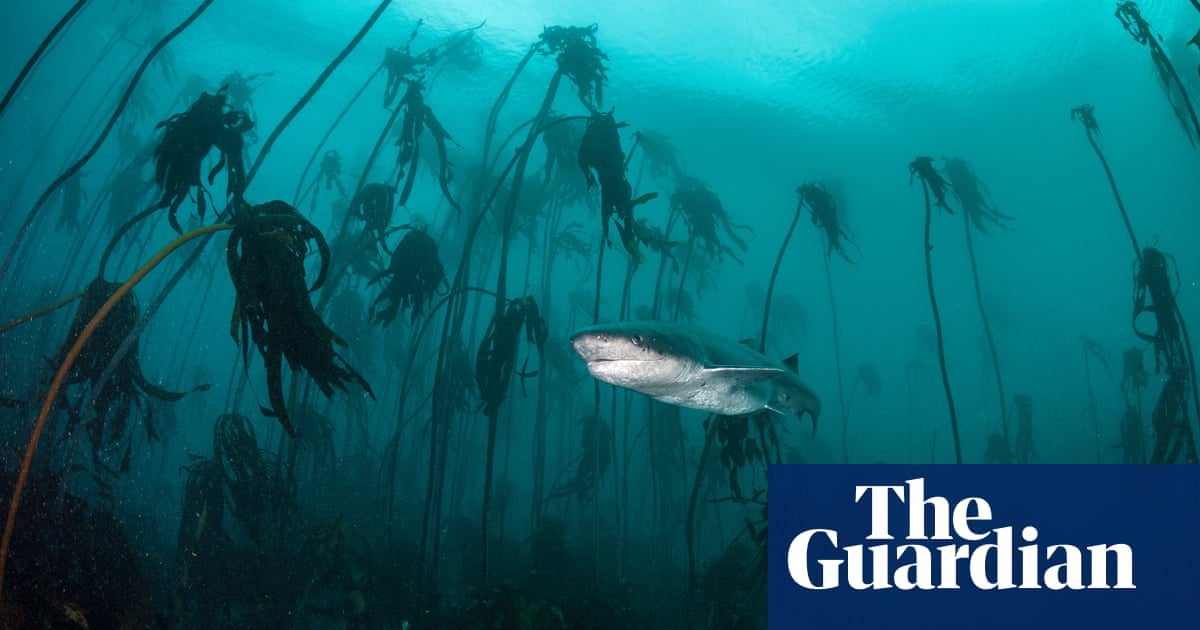
The life of a nature documentary maker can be rough. It nearly killed Craig Foster, creator and human co-star of the Oscar-winning My Octopus Teacher. After 25 years of filming, his brain, lungs and liver were “full of parasites” picked up in the forests of Gabon and the lakes of Malawi and Rwanda, and a case of cerebral malaria very nearly finished him off. He spent a month in hospital – during which the man in the bed beside him died and fever-dream crows crowded outside the window – and then he returned to the Cape of Good Hope in South Africa, where he was born and raised, plunging into the freezing Atlantic Ocean.
In Amphibious Soul, Foster tells how the sea, or, as he refers to it, “Big Mother”, has healed him, both physically and spiritually. He’s referring to one patch of ocean in particular: the Great African Sea Forest, a wilderness of swaying kelp, sharks and violent waves off the Cape. This was where his actual mother swam, with Foster in her belly, until the day he was born; it’s where his father informally baptised him; and it’s where the adult Foster experiences a kind of rebirth and develops extraordinary relationships with its non-human residents.
The emotional outline of this story will be familiar to those who have seen My Octopus Teacher, the hit 2020 Netflix documentary about Foster’s love affair with a female common octopus. But anyone hoping for a retelling of that story will be disappointed. Indeed, we don’t meet the famous mollusc until well past the halfway mark, and even then she is dealt with in a single sentence. This is a curious omission in a book about the power of connection to nature, especially considering that in the film he claims to have genuinely fallen in love with the octopus. Undoubtedly, the truth of their relationship was contorted by the demands of narrative, but an interrogation of this would have been welcome, as would an engagement with some of the weirder critical responses to the film, such as feminist theoretician Sophie Lewis’s viral claim that he had a “form of sex” with the octopus.
How can humanity repair its bond with the natural world? This is the question at the heart of Amphibious Soul. Clearly, simply spending time in nature isn’t enough. Foster spent his career in the wildest places: following 14ft Nile crocodiles into their underwater dens, joining Indigenous San trackers, or bushmen, hunting with poison arrows, tasting the marrow from a giraffe’s leg bone, and feeling all the time as though the wildness he craved was just out of reach. “I needed to somehow get inside nature,” he writes, “feel her inside me, know her, instead of merely observing and studying her from the outside.”
Inspired by the trackers, he begins freediving in the Sea Forest with the ambitious aim of learning to read this submarine landscape as the San read the bush. He follows the faint trails left by whelks, obsessively matches the holes drilled into empty shells to their predators, learns that soaring kelp gulls give clues about the whereabouts of otters, and that water temperature can predict the location of sharks.
Underwater, observing nature in action, is where Foster is at his strongest. Unfortunately, as he becomes literate in the language of the environment, he also becomes more confident in his ability as a medium for nature’s messages. What does nature have to say? Amazingly, it generally seems to be talking about Craig Foster. A compass jellyfish, recovering from a sea bream attack, is eloquent about his own journey to recovery. The kelp forest sings faint words to him: “Heal your amphibious soul.” Even when nature isn’t speaking explicitly about Foster, it’s saying things he agrees with: save the oceans, protect the wilderness. Sentiments I would applaud, if my five-year-old had crayoned them on to a poster for Earth Day.
If nature could talk, what would it really say? Would it issue inspiring platitudes? Or would it have more frightening messages? Perhaps it would remind us that its heart beats to the rhythm of renewal and decay, and that mass extinction might simply be another season. I suspect that nature’s voice would be as encouraging, or as violent, or as devastatingly indifferent as the listener desired.
That we urgently need to repair our relationship with the natural world is beyond doubt. But Foster suggests we start by learning from him. We should, he writes, become trackers, too: in parks, gardens, ponds, forests, for an hour or so a day. If we do that, then “the whole world becomes a magical place that you are in dialogue with”. I take his advice into my garden and follow a sparkling trail towards my very own mollusc teacher, that single-tentacled octopus of the flowerbeds, a slug, grey and determined as a tongue in search of a mouth. And what is this tongue trying to tell me, as it laps hungrily at a fox turd? Nature’s soul is more mysterious than we can possibly imagine.
after newsletter promotion
